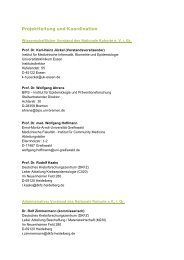Scientific Concept of the National Cohort (status ... - Nationale Kohorte
Scientific Concept of the National Cohort (status ... - Nationale Kohorte
Scientific Concept of the National Cohort (status ... - Nationale Kohorte
Create successful ePaper yourself
Turn your PDF publications into a flip-book with our unique Google optimized e-Paper software.
A.4 integrated data management<br />
A.4.1 Aims and requirements<br />
143<br />
A.4 Integrated Data Management<br />
The general aim <strong>of</strong> <strong>the</strong> common data management infrastructure is to support <strong>the</strong> <strong>National</strong><br />
<strong>Cohort</strong> in all phases and parts by using pr<strong>of</strong>essional IT. This includes <strong>the</strong> following:<br />
� IT support <strong>of</strong> recruitment and management <strong>of</strong> participants and schedule management<br />
at <strong>the</strong> local study centers<br />
� Efficient, standardized data collection both with manual input and using diagnostic<br />
devices; support <strong>of</strong> collecting, processing, storing, and managing biological samples<br />
� Secure storage and archival <strong>of</strong> data according to data privacy protection rules and<br />
such that availability, integrity, and confidentiality <strong>of</strong> all data are guaranteed at any time<br />
� Quality control <strong>of</strong> decentrally and centrally collected data (standardization, reliability,<br />
validity, completeness, and plausibility) by means <strong>of</strong> automatic quality control procedures<br />
as well as support <strong>of</strong> manual quality checks<br />
� Integration <strong>of</strong> data collected at <strong>the</strong> study centers into a common data set, ensuring a<br />
high quality standard and on-demand availability and which supports efficient analysis<br />
� Providing and controlling access to study data for use in internal and external research<br />
projects, and reintegrating data resulting from internal and external research<br />
projects in <strong>the</strong> central data base <strong>of</strong> <strong>the</strong> <strong>National</strong> <strong>Cohort</strong>.<br />
Two different types <strong>of</strong> data must be distinguished: One is <strong>the</strong> personal identifying data <strong>of</strong><br />
<strong>the</strong> study subjects; <strong>the</strong> o<strong>the</strong>r is <strong>the</strong> actual study data, i.e., all medical information collected<br />
from <strong>the</strong> subjects after <strong>the</strong>y have given <strong>the</strong>ir consent to participate in <strong>the</strong> study. Personal<br />
identifying data are needed only for contacting study subjects during recruitment and followup,<br />
possibly for submitting incidental findings according to <strong>the</strong> regulations described in <strong>the</strong><br />
ethics concept, and for requesting secondary data from external sources. Study data are<br />
needed for scientific analysis only.<br />
The data for <strong>the</strong> <strong>National</strong> <strong>Cohort</strong> with its large number <strong>of</strong> recruiting study centers and o<strong>the</strong>r<br />
involved institutions can only be efficiently managed by standardizing data collection and<br />
processing. The implementation <strong>of</strong> a centralized data management infrastructure represents<br />
an important resource for all institutions that take part in this large, long-term cohort<br />
study. The central organization supports standardization <strong>of</strong> instruments and processes and<br />
optimization <strong>of</strong> data quality, guarantees high availability <strong>of</strong> all data, and enables study-wide<br />
common handling <strong>of</strong> data privacy protection regulations. The effort for data management <strong>of</strong><br />
individual institutions is at <strong>the</strong> same time minimized through <strong>the</strong> use <strong>of</strong> common IT solutions.<br />
Requirements for integrated data management comprise both general requirements for<br />
cohort studies and large-scale distributed systems and specific requirements resulting from<br />
<strong>the</strong> large number <strong>of</strong> institutions involved in <strong>the</strong> <strong>National</strong> <strong>Cohort</strong>:<br />
� Data quality and standardization: Data quality is essential in order for <strong>the</strong> results<br />
obtained from scientific analysis <strong>of</strong> study data to be valid. Data quality management<br />
can be considered with regard to content (see Sect. A.5) and from a technical perspective.<br />
Technical components <strong>of</strong> data quality management, which must be provided<br />
by <strong>the</strong> data management infrastructure, are:<br />
– Consistent reference to <strong>the</strong> data collection instruments and <strong>the</strong>ir respective parts,<br />
structure, presentation, and resulting values throughout all data structures and<br />
applications<br />
– Automatic checks for completeness, plausibility, and consistency wherever possible<br />
A.4



